宾语从句,适用于人教版新目标九年级英语上册
- 格式:docx
- 大小:26.27 KB
- 文档页数:2
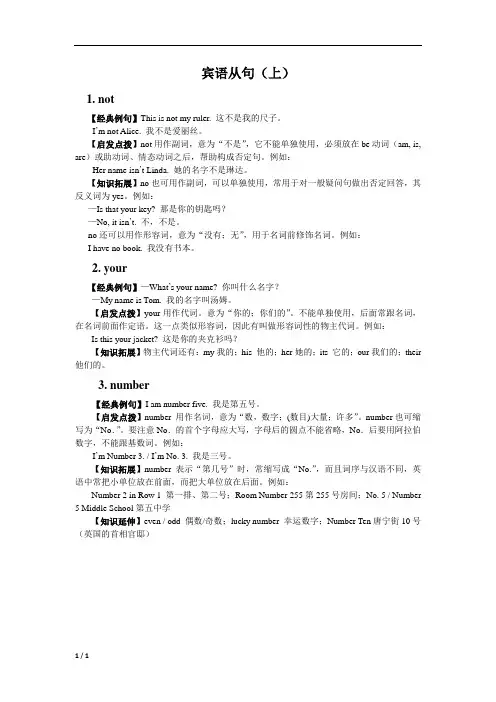
宾语从句(上)1. not【经典例句】This is not my ruler. 这不是我的尺子。
I’m not Alice. 我不是爱丽丝。
【启发点拨】not用作副词,意为“不是”,它不能单独使用,必须放在be动词(am, is, are)或助动词、情态动词之后,帮助构成否定句。
例如:Her name isn’t Linda. 她的名字不是琳达。
【知识拓展】no也可用作副词,可以单独使用,常用于对一般疑问句做出否定回答,其反义词为yes。
例如:—Is that your key? 那是你的钥匙吗?—No, it isn’t. 不,不是。
no还可以用作形容词,意为“没有;无”,用于名词前修饰名词。
例如:I have no book. 我没有书本。
2. your【经典例句】—What’s your name? 你叫什么名字?—My name is Tom. 我的名字叫汤姆。
【启发点拨】your用作代词。
意为“你的;你们的”。
不能单独使用,后面常跟名词,在名词前面作定语。
这一点类似形容词,因此有叫做形容词性的物主代词。
例如:Is this your jacket? 这是你的夹克衫吗?【知识拓展】物主代词还有:my我的;his 他的;her她的;its 它的;our我们的;their 他们的。
3. number【经典例句】I am number five. 我是第五号。
【启发点拨】number 用作名词,意为“数,数字;(数目)大量;许多”。
number也可缩写为“No.”。
要注意No.的首个字母应大写,字母后的圆点不能省略,No.后要用阿拉伯数字,不能跟基数词。
例如:I’m Number 3. / I’m No. 3. 我是三号。
【知识拓展】number表示“第几号”时,常缩写成“No.”,而且词序与汉语不同,英语中常把小单位放在前面,而把大单位放在后面。
例如:Number 2 in Row 1 第一排、第二号;Room Number 255第255号房间;No. 5 / Number 5 Middle School第五中学【知识延伸】even / odd 偶数/奇数;lucky number 幸运数字;Number Ten唐宁街10号(英国的首相官邸)宾语从句专练(上):I. 单项选择。
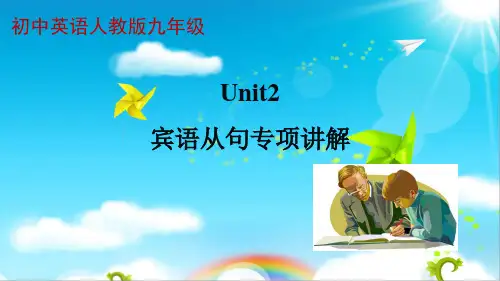
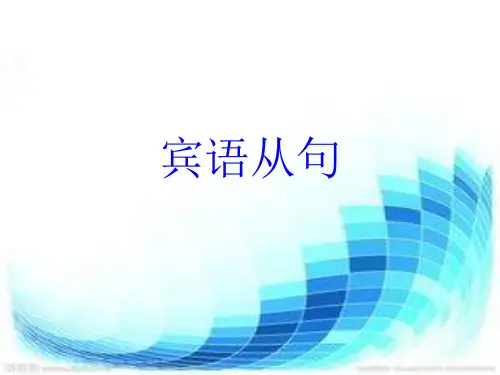
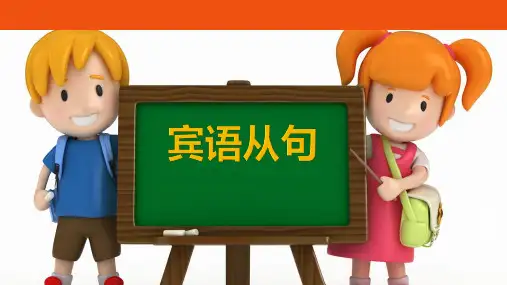
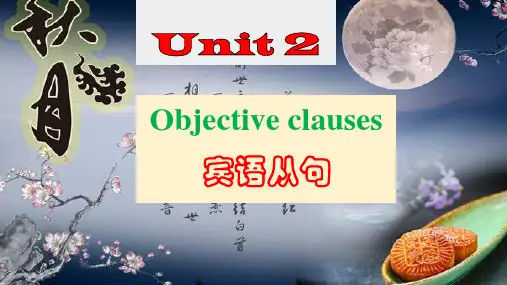
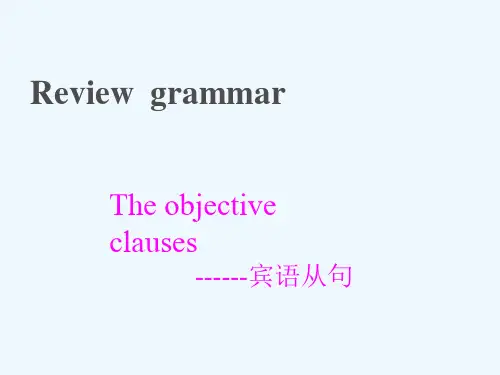
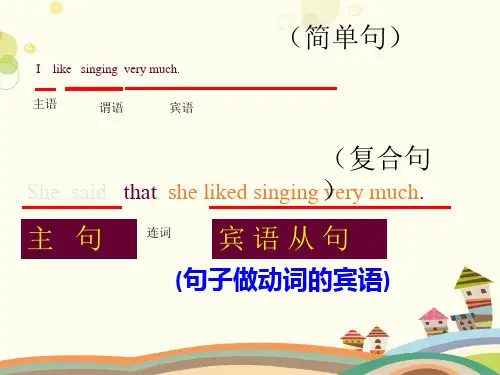
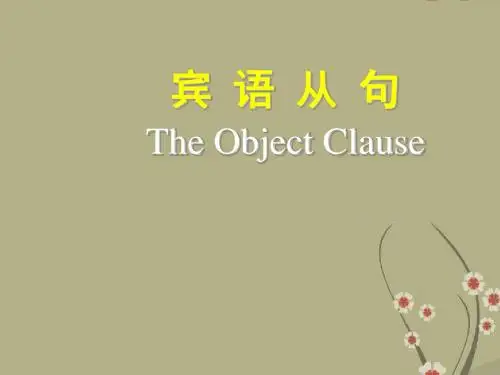
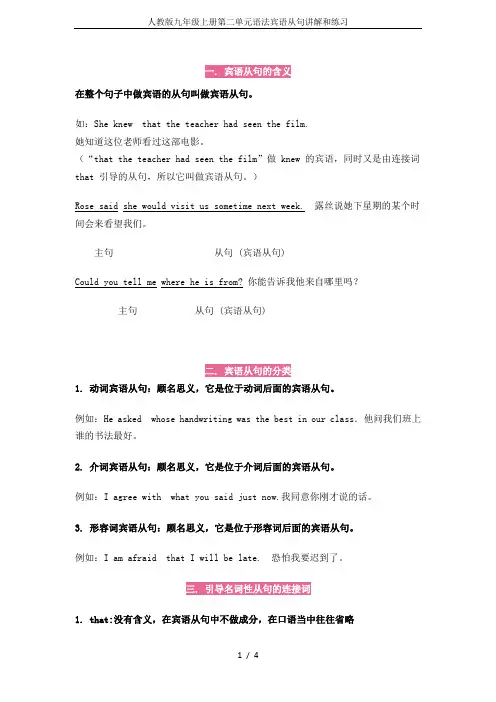
在整个句子中做宾语的从句叫做宾语从句。
如:She knew that the teacher had seen the film.她知道这位老师看过这部电影。
(“that the teacher had seen the film”做 knew 的宾语,同时又是由连接词that 引导的从句,所以它叫做宾语从句。
)Rose said she would visit us sometime next week. 露丝说她下星期的某个时间会来看望我们。
主句从句 (宾语从句)Could you tell me where he is from? 你能告诉我他来自哪里吗?主句从句 (宾语从句)1. 动词宾语从句:顾名思义,它是位于动词后面的宾语从句。
例如:He asked whose handwriting was the best in our class.他问我们班上谁的书法最好。
2. 介词宾语从句:顾名思义,它是位于介词后面的宾语从句。
例如:I agree with what you said just now.我同意你刚才说的话。
3. 形容词宾语从句:顾名思义,它是位于形容词后面的宾语从句。
例如:I am afraid that I will be late. 恐怕我要迟到了。
1. that:没有含义,在宾语从句中不做成分,在口语当中往往省略I am going to meet my net friends in Guangzhou. He said. →He said (that) he was going to meet his net friends in Guangzhou. 他说他将要在广州见他的网友。
2.whether/if:表示是否,在宾语从句中不做成分。
引导词的选用:如果主句没有疑问的意思,则引导词用that;若主句有疑问的意思,则根据意思选用if / whether或特殊疑问词。
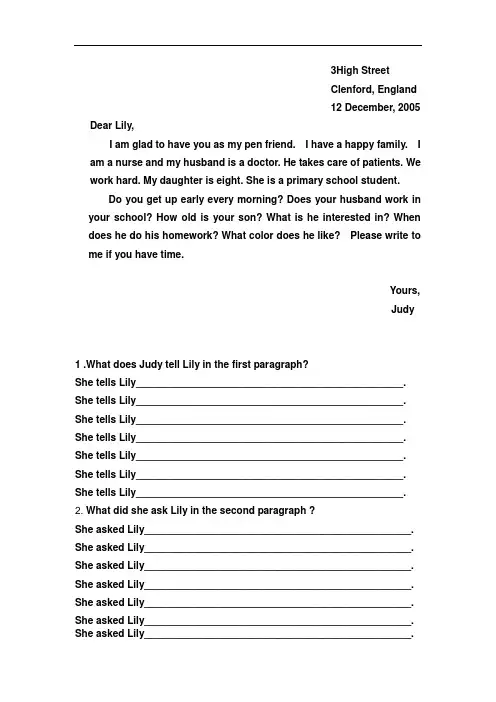
3High StreetClenford, England12 December, 2005Dear Lily,I am glad to have you as my pen friend. I have a happy family. Iam a nurse and my husband is a doctor. He takes care of patients. We work hard. My daughter is eight. She is a primary school student.Do you get up early every morning? Does your husband work in your school? How old is your son? What is he interested in? When does he do his homework? What color does he like? Please write to me if you have time.Yours,Judy1 .What does Judy tell Lily in the first paragraph?She tells Lily________________________________________________. She tells Lily________________________________________________. She tells Lily________________________________________________. She tells Lily________________________________________________. She tells Lily________________________________________________. She tells Lily________________________________________________. She tells Lily________________________________________________. 2.What did she ask Lily in the second paragraph ?She asked Lily________________________________________________. She asked Lily________________________________________________. She asked Lily________________________________________________. She asked Lily________________________________________________. She asked Lily________________________________________________. She asked Lily________________________________________________. She asked Lily________________________________________________.宾语从句一.定义:在复合句中做主句宾语的从句叫宾语从句。
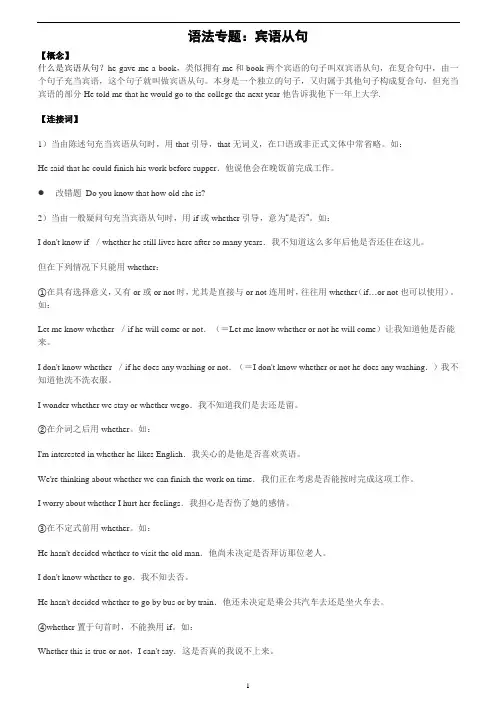
语法专题:宾语从句【概念】什么是宾语从句?he gave me a book,类似拥有me和book两个宾语的句子叫双宾语从句,在复合句中,由一个句子充当宾语,这个句子就叫做宾语从句。
本身是一个独立的句子,又归属于其他句子构成复合句,但充当宾语的部分He told me that he would go to the college the next year他告诉我他下一年上大学.【连接词】1)当由陈述句充当宾语从句时,用that引导,that无词义,在口语或非正式文体中常省略。
如:He said that he could finish his work before supper.他说他会在晚饭前完成工作。
改错题Do you know that how old she is?2)当由一般疑问句充当宾语从句时,用if或whether引导,意为“是否”。
如:I don't know if /whether he still lives here after so many years.我不知道这么多年后他是否还住在这儿。
但在下列情况下只能用whether:①在具有选择意义,又有or或or not时,尤其是直接与or not连用时,往往用whether(if…or not也可以使用)。
如:Let me know whether /if he will come or not.(=Let me know whether or not he will come)让我知道他是否能来。
I don't know whether /if he does any washing or not.(=I don't know whether or not he does any washing.)我不知道他洗不洗衣服。
I wonder whether we stay or whether wego.我不知道我们是去还是留。
Unit 2 I think that mooncakes are delicious.宾语从句精讲精练 ★.什么是宾语从句?试比较:We know him .(简单句) 主s 谓v 宾oWe know (that ) he likes English. (复合句)主s 谓v ↓ 主s 谓v 宾o主句 连 接 词 宾o (宾语从句)宾语从句就是由一个句子来构成主句的宾语★宾语从句的概念:在复合句子中起宾语作用的句子叫做宾语从句★请观察下列例句,归纳出宾语从句的三要素1.Mooncakes are delicious. I think. (合并句子)肯定句 →I think (that )mooncakes are delicious.2. Is he right? I wonder. (合并句子) 一般疑问句→I wonder whether/if he is right.3 Where will we go for vacation? I don ’t know . (合并句子)特殊疑问句 →I don ’t know where we will go for vacation?4.The earth moves around the sun. The teather tell us . (合并句子) →The teather tell us the earth moves around the sun.宾语从句三要素: 连接词 语序 时态陈述句 that (可略)无词义,陈述意义(一)连 接 词 一般疑问句 if/whether 是否 表示疑问意义特殊疑问句 特殊疑问词what/who/which/whose/whomWhere/w hen/how/wh y …只能用whether 不能用if 的情况当与or not 连用,或提出两种选择 时.I don’t know whether he’s free or not.Mary asked whether I was doing my homework or not. Tell me whether you’d like to go shopping or tidy the room .(二)语序:陈述句语序即:主句+连接词+宾语从句(主+谓+其他成分) ①主句+(that )+ 陈述句②主句+ if/whether +陈述句语序(将般疑问句改为陈述句)③主句+ 特殊疑问词+ 陈述句语序(主+谓+其他成分)温馨提示:当从句的原句为以下句子以及what, who 作主语时,语序不变: 1.What’s wrong ( with sb)? What’s the matter ( with sb)? 2.What’s happening? What happened? 3.Who is over there ?Eg. What’s wrong with him ? I don’t know (合并句子) →I don’t know what’s wrong with him ..Who is over there ? Can you tell me ? (合并句子) →Can you tell me who is over there ?(三)时态:1.These flowers are from Guangdong. He said.He said_______ these flowers ______ _______ Guangdong.2. Light(光) goes faster than sound. My teacher told me.My teacher told me _____ light _______ faster than sound.3.Can they speak French? I want to know.I want to know ______ _______ _______ _______ French4 Are the children playing games? Tell me.Tell me ______ the children ______ ______ games.5 Where did she put her car? Do you knowDo you know _____ ___ ____ her car?6 What does he often talk about? The girl wondered.The girl wondered _____ _____ often ________ about.7.Who knocked at the door so loudly? I don’t knowI don’ t know ______ _______ at the door so loudly.8.Does he still live in that street? I don't know.I don't know____________________________________________9.When does the train arrive? Please tell me.Please tell me________________________________________10. Do they want fried chicken? He asked the boys.He asked the boys_______________________________________Exercise2用词的适当形式填空1.The radio says it _________ cloudy tomorrow. (be)2.The headmaster hopes everything ______ well. (go)3.Tom says that they ____________ (play) basketball at six o’clock yesterday evening.4.I didn’t know what time he _______ the letter. (wri te).5.Could you tell me who ___________ away the book already? (take)6.Our teacher told us in class the sun _______ in the east. (rise)7.Can you tell me what they ______ yesterday? (do)Exercise3单项选择( ) 1.Could you tell me if it _____ tomorrow?A. rainsB. is rainingC. will rainD. Rain( )2. I'm sure___ he will be here on time.A. ifB. thatC. whetherD. when( )3. Can you tell me ______?A. what's the matter with himB. what the matter with him is.C. what happened with himD. what with him happened ( )4. Let me tell you ______?A. how much is the carB. how much does the car costC. how much did I pay for the carD. how much I spent on the car ( )5. Peter knew _______.A. whether he has finished reading the bookB. why the boy had so many questionsC. there were 12 months in a yearD. when they will leave for Paris( )6. Bruce says _______ he can come at 9:00 tomorrowA. whenB. whatC. thatD. what time( )7. Dave, could you teach me ______ to search the Internet?A. thatB. howC. whenD. why( )8. Could you tell me ______?A. where is the nearest railway stationB. where the nearest railway station wasC. where the nearest railway station isD. where was the nearest railway station( )9. He was afraid ______ he would forget his Chinese.A. ifB. whenC. howD. that( )10 Mike asks Lin Yang _______ he has been in Beijing.A. how longB. whereC. howD. that。
宾语从句一.定义:以一个句子作宾语,这个句子就叫宾语从句。
I think he’s a good boy.(宾语从句)(I think是主句)二.通常作三种词的宾语:1.放在动词后作宾语;I think he’s a good boy.2.作介词宾语;Please pay attention to what I say.3.放在某些形容词后作宾语,如:afraid. sure, certain, glad, surprised等。
I’m happy that you can call me back.三.宾语从句三要素:1.陈述语序;2.引导词;3.时态1.陈述语序:主语+谓语+其他。
(陈述语序就是主语在前,谓语在后的语序。
也就是陈述句,它包括肯定句和否定句,它对应的是倒装语序。
倒装语序即把谓语的全部或一部分放在主语前面的语序,如疑问句通常就是倒装语序。
)如:He is a boy. (陈述语序)Is he a boy?(疑问语序又叫倒装语序)I like English.(陈述语序)Do you like English?(疑问语序又叫倒装语序)2.引导词:有三种1).that;2).if/whether;3).疑问词如what/how/where/who...1).以that引导的宾语从句He’s a good boy. I think.(合并为一句)→I think (that) he’s a good boy.总结:作宾语从句的由“原来是陈述句”变来,用that引导,无意义,常可省略(注意:第二个连词that不可省)。
2)..以if/whether引导的宾语从句Is he a good boy? I wonder.(合并为一句)I wonder if/whether he is a good boy.总结:作宾语从句的由“原来是一般疑问句”变来,用if/whether引导,意为“是否”,表达的意思不确定。
原来的疑问语序变为陈述语序,句尾用句号还是问号由主句决定。
if/whether常用在ask, wonder, can/could you tell me 等后。
具有一定的意义,所以不能省略。
3)..以疑问词如what/how/where/who...引导的宾语从句How can I learn English well? I want to know.(合并为一句)I want to know how I can learn English well.总结:作宾语从句的由“原来是特殊疑问句”变来,就用该疑问词引导,原来的疑问语序变为陈述语序(若本来就是陈述语序的,则不变),句尾用句号还是问号由主句决定。
3.时态宾语从句的时态一般受主句的时态制约:1).若主句是现在时态,宾语从句的时态不受限制, 可以根据实际表达的需要来确定。
I have finished my homework. He says. (合并为一句)→He says that he has finished his homework. (原时态不变)2).若主句是过去时态,从句一般要用相应的过去时态。
I'm sorry for being late for class. The girl said. (合并为一句)→The girl said that she was sorry for being late for class.(一般现在时→一般过去时)变化如下:①一般现在时→一般过去时;②现在进行时→过去进行时③现在完成时→过去完成时;④一般过去时→过去完成时;(若有具体的时间状语若in 1990, 时态则不变。
)⑤一般将来时→过去将来时。
⑥过去进行时→不变;⑦过去完成时→不变;⑧过去将来时→不变;3).如果宾语从句的内容是客观事实或真理、自然现象,不管主句是何种时态,从句不受主句限制,都要用一般现在时时态。
“The earth moves around the sun.” the teacher said.(合并为一句)→The teacher said that the earth moves around the sun. Everyone answered there are sixty minutes in an hour.4.否定的前移若主语的谓语动词为think, believe, (expect, guess, imagine, suppose)等, 且主语为第一人称I/We时, 其后的宾语从句若是否定的, 要把否定词转移到主句谓语上,从句谓语用肯定式。
This dress doesn’t fit you well. I think.(合并为一句)→I don’t think this dress fits you well. (我认为这件衣服不适合你穿。
)(注:当主句主语为第一人称时,后面若接附加疑问句,那么附加疑问句的主语、谓语应与从句中的主谓语保持一致。
)如:I don’t believe he is a doctor, is he?I don't think he looks like his father, does he?5. whether和if的用法区别:以下情况只能whether用而不能用if:①在介词之后作宾语②与or not连用③不定式之前④引导主语从句且放在句首时⑤引导表语从句时安徽近年来中考真题(2017·安徽)41.—Do you know ______ Ann goes to workevery day?—Usually by underground.A. whyB. howC. whenD. whether答案B【解析】考查宾语从句中的连接词。
句意:—你知道Ann每天______上班吗?--常常乘坐地铁。
由答语意思知,问者问的是Ann上班的方式。
故选B。
(2018·安徽)39.—I wonder _______ Jane gets on so well with her classmates.—Because she always cares much about others.A. whetherB. howC. whenD. why答案D【解析】考查宾语从句之连接词。
句意:——我想知道Jane为什么与她的同学关系相处得那么好。
——因为她总是关心别人多一些。
从答语可知选D。
(2019·安徽)40. — I wonder _______ the students have a physical examination.— Once a year.A.how farB. how soonC. how longD. how often答案D【解析】考查宾语从句之连接词。
how far多远,对距离提问;how soon多久,对将来时态中“in +时间段”提问;how long多久,对for/since引导的时间状语或从句提问;how often多久一次,对频率提问。
从答语Once a year知,上句谈论的是“频率”,应用how often连接宾语从句。
句意:——我想知道,这些学生多久进行一次体检。
——每年一次。
故选D。
(2020安徽)29. —Could you tell me ______ we can start a conversation with a foreigner?—Talking about weather is a good choice.A. howB. whyC. whereD. when29. A 考查宾语从句之连接词。
从答语“谈论天气是一个好的选择”知,发话者问的是与一个外国人开始会话的方式,应用how引导宾语从句。
故选A。
(2021·安徽)28.--I’m not sure______my suggestion is helpful to you.--It certainly is. Every little bit helps.A.whyB.howC.whetherD.where宾语从句专项练习1 The girls asked if they ____ some food and drink with them.A. tookB. takeC. takesD. will take2 Catherine said that she ___ to Guangzhou.A.has never goneB. had never goneC. has never beenD. had never been3 The students want to know whether they___ dictation today.A. hadB. has .C. will haveD. are 4 She asked Linda if___ go and get some.A.could sheB. she couldC. she canD. she may5 Linda said the moon___ round the earth.A.travelledB. has travelledC. travelsD. had travelled6. Can you tell me___ you were born, Betty?A. whoB. whatC. whenD. that7 I don't know ___ they have passed the exam.A. whatB. ifC. whenD. where8 I hardly understand.___ he has told me.A. thatB. whatC. whichD. who9. She didn't know___ back soon.A. whether he would beB. if would he beC. he will beD. if he will come10.I don't know _____ he still lives here after so many years.A. whether B where C. what D.when11.Do you know _____ they listened to yesterday evening?A. what B when C why D how12.He asked me _____told me the accident.A whomB whichC whoD whose13.They don't know _______their parents are.A thatB whatC whyD which14.Please tell me ______last year.A.where does your sister workB. where did your sister workC where your sister worksD. where your sister worked15.She asked me if I knew ______A. whose pen is itB. whose pen it wasC. whose pen it isD. whose pen was it16. You must remember ________.A. what your mother saidB. what did your mother sayC. your mother said whatD. what has your mother said17. Did you know ____?A. who he was looking afterB. who was he looking forC. who he is looking forD. who he is looking after18. Could you tell me ___?A. when will they leave BeijingB. when would they leave BeijingC. when they will leave BeijingD. when did they leave Beijing。